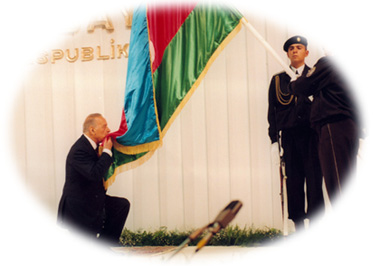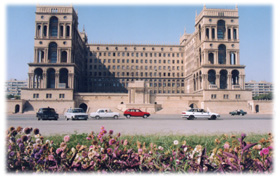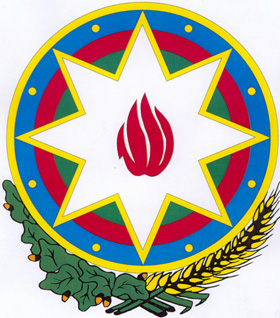flat72.jpg)


Government Government
and Institutions Inauguration of his Excellency Heydar Aliyev as the president of the Republic of Azerbaijan The Azerbaijani Constitution, the supreme legal document in the republic, was adopted in November 1995. According to this document, there is no state religion in Azerbaijan and the republic is a secular state with clear separation between state and religion. Further, it is specified that the public educational system must be secular. The Constitution stipulates that each citizen is entitled to equal rights "irrespective of race, nationality, religion, gender, origin, property status, social position, convictions, political party, trade union organization and social affiliation." In addition, the Constitution declares the right to free enterprise, and bars monopolies and unfair competition in economic relations. The official language of the state is Azerbaijani, but all citizens have the right to free use of their native language. An important advance in formalizing the rights of many of the residents of Azerbaijan, especially refugees from other parts of the former Soviet Union, was the adoption of the Law on Citizenship, approved in September 1998. The Constitution provides for a division of power between three branches of government: executive, legislative, and judicial. The President is the head of state, bearing ultimate responsibility for both internal and external matters, and is authorized to appoint and dismiss members of the cabinet, including the Prime Minister. The President serves as Commander in Chief of the Azerbaijani Armed Forces. Presidential decrees are a frequently used mechanism of governance in Azerbaijan. The powers of the President include drawing up the state budget (subject to ratification by the Milli Mejlis); designation of state economic and social programs; appointment of local governors; appointment and removal of members of the board of the National Bank; concluding of intergovernmental treaties (some of which require approval of the Milli Mejlis), and declaration of war and concluding of peace (requiring approval of the Milli Mejlis). In addition, the President has the authority to declare martial law and a state of emergency in part or all of the territory of the Republic of Azerbaijan. The President is elected in general elections for a term of five years and can serve a maximum of two consecutive terms. To be elected, a presidential candidate must receive at least two-thirds of the votes of the participants in the election. If none of the candidates receive this amount in the first round of elections, a second round is held on the second Sunday after it. If the President retires or dies before the end of his term, new presidential elections are to be held within three months. In the interim, the Chairperson of the Milli Mejlis (National Parliament) performs the duties of the President. If during this period the Chairman of the Parliament resigns or cannot fulfill the duties, the authority of the President is passed to the Prime Minister. If the Prime Minister cannot exercise the presidential duties, the Parliament is authorized to elect another official to serve temporarily as President. House of Government in Baku The Cabinet of Ministers is subordinate to the President and its aim is the implementation of the President's policies and duties. In order to achieve this goal, the Cabinet of Ministers ensures the implementation of the state budget; financial, credit, monetary policy; and the state social programs. The National Parliament of the Republic of Azerbaijan is a unicameral body consisting of 125 members, of whom 100 are elected in local contests and an additional 25 from national party lists. Parliamentary elections are to be held every five years, on the first Sunday of November. The Parliament holds two regular sessions - the spring session (February 1 -May 31), and the fall session (September 30 -December 30.) Special sessions can be summoned by the Chairman of the Milli Mejlis, at the request of the President. The Parliament's responsibilities include determining legislation affecting human and civil rights and freedoms, elections, the court system, civil law, inheritance, rights of ownership, the legal regime of state, private and municipal property, financial activity, taxes and payments, labor relations and social security, ratification and rejection of international treaties, communication and transport, customs, banking, accounting and insurance. The laws and resolutions enacted by the Parliament come into effect from the day of their publication unless specified otherwise in the legislation. The President does not have the right to dissolve the Parliament, but he does have the right to veto its decisions. To override a presidential veto, the Milli Mejlis must have a majority of 95 votes. At this point, the judicial branch has the largest gap between its formal and its actual powers. This branch has not received public confidence in its professionalism and impartiality, which requires improvement. The judicial branch includes a Supreme Court, Economic Court and Constitutional Court. The President, subject to approval by the Parliament, nominates the judges in these three courts. The Constitutional Court consists of nine judges and is authorized to review the constitutionality of the laws of the republic, presidential decrees, regulations of the central government authorities, and signatures on treaties, as well as settling disputes connected to the division of power between the legislative and executive branches. In addition, the Constitutional Court decides on issues affecting the banning of political parties or other organizations. The Constitutional Court is also authorized to interpret the Constitution and the laws of the Republic of Azerbaijan at the request of the President, the Parliament, the Cabinet of Ministers, General Prosecutor's Office and the Ali Mejlis (Supreme Parliament) of the Nakhichevan Autonomous Republic. Judges of the Supreme Court of the Republic of Azerbaijan are nominated by the President and approved by the Parliament. The Economic Court of the Republic of Azerbaijan is the highest legal body deciding economic disputes. Judges to the Economic Court are appointed in the similar manner to the other high courts. Within the Republic of Azerbaijan, Nakhichevan is an autonomous republic and consists of six districts: Ordubad, Julfa, Shahbuz, Babek, Sharur, and Sadarak. Nakhichevan has its own Parliament, as well as Cabinet of Ministers and Supreme Court. The Chairperson of Nakhichevan's Parliament serves as the highest official of the autonomous republic. The Constitution of the Republic of Azerbaijan and its laws are valid in Nakhichevan, and laws and resolutions enacted there must not contract the state laws and resolutions.
Local
Government
There are many gaps between the formal declarative aspects of the Azerbaijani political system and how it functions in practice. Some political restrictions are still imposed, and since independence some of the political turnovers have not occurred to legally established mechanisms. One of the notable aspects of politics in Azerbaijan is the absence of violence between conflicting Azerbaijani groups. Since independence, a number of uprisings have taken place and coup attempts made; yet they have not escalated and have been conducted with little bloodshed. In addition, despite the significant number of refugees and the difficulties in providing many social services in the republic, there have been few expressions of political violence.
|




